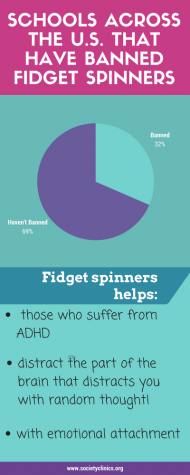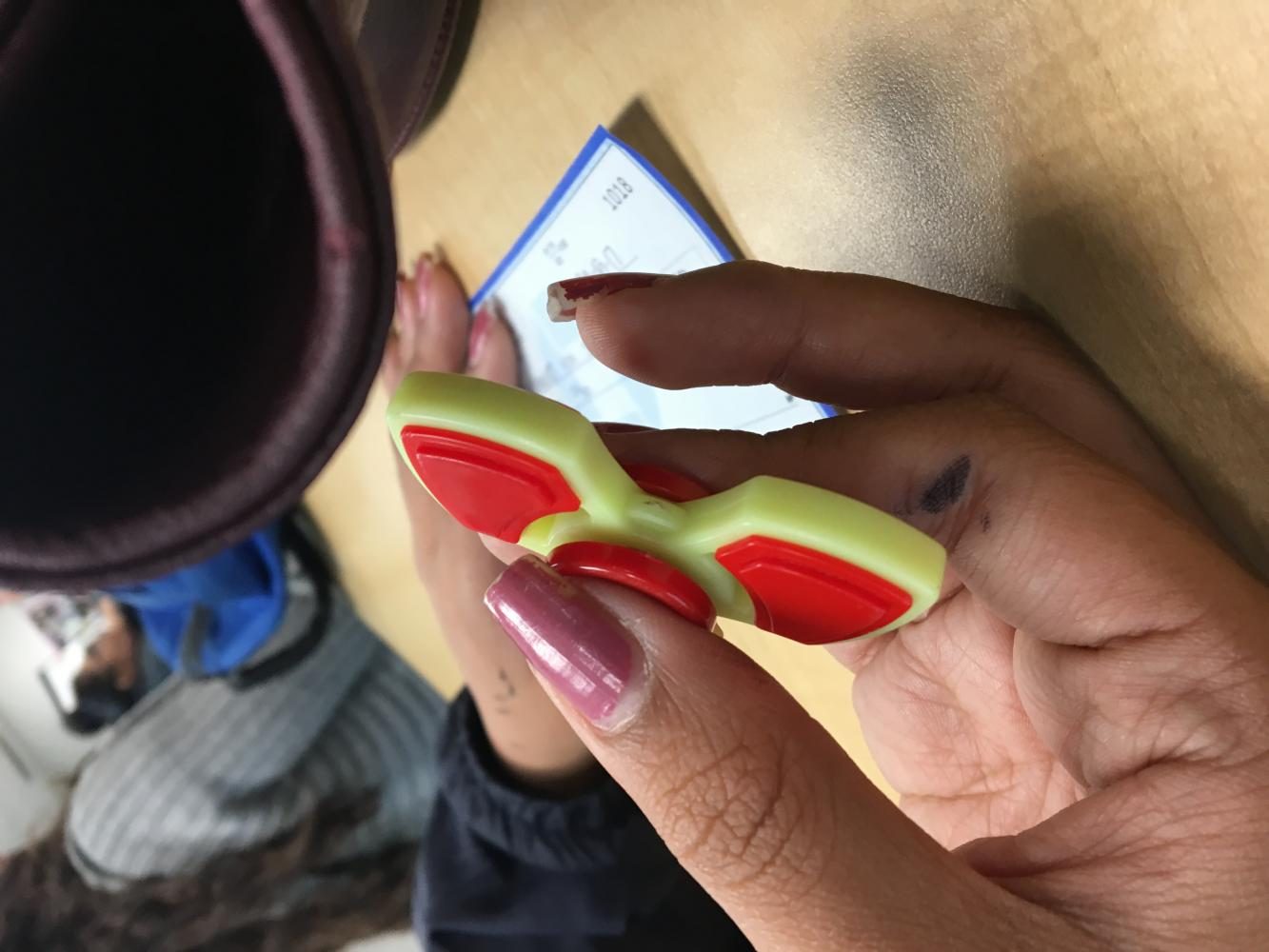Fidget Spinners
May 25, 2017
Sophomore Sofia Nunez enjoys using a fidget spinner and says that it helps her concentrate in class.
Fidget spinners: the distraction that is not a distraction
Fidget spinners,“small, ball-bearing devices that the user can rotate between his or her fingers,” have become the trend of 2017. In every single class, there are a handful of students using a fidget spinner to help them study in class.
Fidget spinners were intended to help those who suffer from ADHD or anxiety, serving as a distraction that can help relieve stress. “For some people [with ADHD], there’s a need for constant stimulation,” said Elaine Taylor-Klau, the co-founder of ImpactADHD, “What a fidget allows some people — not all people — with ADHD to do is to focus their attention on what they want to focus on, because there’s sort of a background motion that’s occupying that need.” A study in 2015 in the Journal of Abnormal Child Psychology showed children between the ages of 8 and 12 with ADHD needed something to “fidget with” when doing tasks with working memory.
But now fidget spinners have ended up in the hands of those who simply just want something to help them concentrate in class. Many people tap their pencils, click their pens or shake their leg. The fidget spinner acts as the substitute and has proven to be useful based on research and experience.

caption
Having something to fidget with is extremely useful. According to Forbes, fidgeting helps “occupy parts of your brain that otherwise would distract the rest of your brain with random thoughts.” They used the analogy of distracting a young child with a toy so that the young child doesn’t constantly bother anybody else. Fidget spinners help with that constant bother.
Forbes also states that fidget spinners can help “emotional attachment to an object.” Many people are attached to physical objects, especially their phones. Having something physical to rely on helps give reassurance and makes one at ease. Just by having a fidget spinner can help make someone’s change completely.
Despite positive uses, many schools are not fond of fidget spinners and have banned them. Washington Elementary in Evanston, Illinois has banned them because they are a “disruption.” Some teachers at Clark ask students to get a doctor’s note in order to use fidget spinners during class, while others simply ban them all together. One teacher told her class that she gets anxious while looking at them.
Sixty-three of 200 of the top high schools, both private and public, in the U.S. have banned fidget spinners according to SpinnerList. The 137 schools that haven’t banned them haven’t banned them because they know that the students actually benefit from them and know that they aren’t just a distraction.
This has outraged students. Not being able to use phones during class is a rule that is understood by everyone (although not always followed). Not talking during class is another. But simply spinning a toy for the purpose of helping someone not get distracted shouldn’t be considered a distraction. They are used to help those who need a distraction in order to concentrate in their studies and assignments. Fidget spinners have not posed any threat and can’t harm or offend anyone.
Student plays with fidget spinner
Schools are correct to say “no” to fidget spinners
A small, palm-sized toy designed to relieve stress and help people focus has become the hot new toy that everyone must have. Fidget spinners are ball-bearing gadgets, either made of metal or plastic, that can spin between the user’s thumb and middle finger. They can cost as little as 99 cents to over $1,000 online and in stores.
The main purpose of fidget spinners is to help kids with ADHD to focus in class says Life Science. Yet, it isn’t guaranteed that all students will benefit from the spinners. According to MONEY, psychologists claim that there is “no scientific evidence to support the idea that they have therapeutic qualities.” Fidget spinners are nothing more than toys and a fad, and schools are correct to ban them.
This spring, these “stress relieving” gadgets have made their big debut on social media, but, despite their popularity, some schools across the country have banned the use of fidget spinners in the classroom. According to SpinnerList, the largest the database of all spinners, 32 percent of the top 200, both public and private, schools in America have banned fidget spinners. Why? They’re a distraction for students.
There has been a controversy among schools on whether or not they should permit the use of fidget spinners in classrooms. But, despite the possible benefits of the spinners, they should be banned. Instead of using them as tools to help with stress or ADHD, students use them as toys to pass the time.
Schools in the United Kingdom have taken part in prohibiting the use of fidget spinners in the classroom. A seventh-grade girl had written a letter to the head of her school, Churchill Academy in Somerset, about how disruptive the toys are in class, according to Telegraph. Shortly after, the headteacher, Chris Hildrew, banned fidget spinners.
In classrooms, students show off their techniques and tricks of using the spinners to others, hindering them from learning. They would attempt to spin the toy on their noses, attach it to pencils, trade them, or even flaunt it to the entire class, annoying teachers. Students would even attempt to throw a spinner at one another and try to catch it.
“Frankly, we’ve found the fidgets were having the opposite effect of what they advertise,” said Kate Ellison, principal of Washington Elementary School in Evanston, in and interview with the Chicago Tribune. Students were paying more attention to the toys than the lesson. Only recently has Washington Elementary decided to ban the fidget toys.
The unique designs and bold colors of the spinners attract more attention from the students in class. A student trying to learn would be interrupted by the loud obnoxious colors and designs. Students would also be bothered by the constant sound of fidget spinners spinning when trying to focus in class.
Washington Elementary wasn’t the only school that banned the distracting gadgets. The Chicago Tribune mentions that Prairieview School has also recently prohibited the use of spinners. Janelle Feylo, a mother of student that attends Prairieview, was “pleased to see a letter from the principal at Prairieview School announcing such a ban.”
Banning fidget spinners has its benefits. Parents won’t have to spend money purchasing fidget spinners for their kids to show off in class. Teachers won’t have to waste their energy arguing with their students to put away the spinners or have to listen to the annoying sounds they have. And the many students who seem to love these gadgets so much won’t be wasting their class time playing with the “toys” that distract other students from the teacher.

